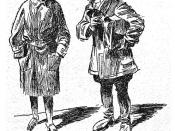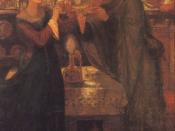Cheap Love John CollierâÃÂÃÂs suspenseful short story âÃÂÃÂThe ChaserâÃÂÃÂ, combines possessive immature love with heart-wrenching wonder. It allows the reader to observe the relationship between an experienced man, and a naïve boy with a pitiful outlook on devotion. This immortal allegory of love has a grim-amusement tone, which is proven through the symbols, irony, and diction.
The symbols allow the reader to see there is more to this situation than meets the eye. When the reader is introduced to Alan Austen, one sees him as a âÃÂÃÂnervous kittenâÃÂÃÂ, because he is not confident in his actions. He knows what he is doing is not morally right, but he continues on. Alan climbs the âÃÂÃÂdark and creaky stairsâÃÂàwhich gives the reader an eerie and anxious feeling of the upcoming events. When he enters the room, it appears to be a very simple quarters with a âÃÂÃÂplain kitchen table, a rocking chair, and an ordinary chairâÃÂàwhich proves the owner is nothing but business.
The old man who inhabits the room has the same aura as the âÃÂÃÂdark and creakyâÃÂàstairs. He is a mysterious and lonely old man who shows no compassion for others. One can observe this lack of compassion since he sells potions that ruin peopleâÃÂÃÂs lives. He proceeds to inform the man Crossley 2 of his need for a love potion that would persuade Diana to return his love. Though Alan is in need of a love elixir, the old man offers him an elixir worth five thousand dollars. He explains this compound as a âÃÂÃÂglove cleanerâÃÂàwhich will cure all the problems he may have. The mentioning of the poisonous potion is foreshadowing for the events that have yet to unfold. The old man knows that once Diana swallows the love potion, she will become an obsessed lover and Alan will need the âÃÂÃÂglove cleanerâÃÂàto get rid of her. His repetition of the poison is symbolic because he knows the fate of the lovers. Alan wants nothing to do with the âÃÂÃÂglove cleanerâÃÂàand purchases the love potion, ignoring the inadvertent forewarnings from the old man. He sells the love potion very cheap because âÃÂÃÂyoung people who need a love potion very seldom have five thousand dollars. Otherwise they would not need a love potionâÃÂÃÂ. This statement is symbolic of AlanâÃÂÃÂs immaturity and selfishness. His need for love is so great that it overpowers his sense of self and does not allow him to see the real value of his life. If he would wait for true love, he would never need the five thousand-dollars as their love would be priceless. One can find humor in this dreadful situation that Alan has encountered. He is too youthful and impatient to foresee the consequences, so the reader can predict the concoctionâÃÂÃÂs effect and laugh. As Alan is leaving the tiny room, he speaks his good-by and thanks the man for his help. The old man replies âÃÂÃÂau revoirâÃÂàwhich is not just a âÃÂÃÂgood-byâÃÂÃÂ, but a good-by for now, or until we meet again. He knows what will happen when Diana takes the love potion and perceives that Alan will be returning for the âÃÂÃÂglove-cleanerâÃÂÃÂ. Despite Crossley 3 this grim situation, the reader is amused with anticipation. One can see that his quest for love is nothing but a plea for a possessive woman.
The irony in the short story allows the reader to perceive things that Alan cannot. Alan expresses to the old man his request for the love potion, and the old man pulls a âÃÂÃÂliquid as colorless as water, almost tastelessâÃÂàoff the shelf.
The description is ironic since this poison is so similar to water, but yet it can kill with just one tablespoon. The old man calls this poison a âÃÂÃÂglove cleanerâÃÂàwhose name is ironic in itself. If one removes the âÃÂÃÂGâÃÂàfrom glove, the remaining will be âÃÂÃÂlove cleanerâÃÂàwhich, when taken by Diana, will acquit Alan of DianaâÃÂÃÂs possessive love. Alan tells the old man that he does not need that kind of potion, but the old man continues to bring it up. This is an example of dramatic irony; for the reader knows that Alan will come back for the elixir. However, he is aloof to the constant foreshadowing of the events yet to come. Alan reiterates the need for this love potion because Diana does not express any kind of love for him. The fact that her name is Diana is ironic as the first syllable in her name is âÃÂÃÂdieâÃÂÃÂ, which will soon be her fate. Again, the reader finds humor and frustration in the realization that Alan does not recognize the consequences. When the old man is informing Mr. Austen of the potionâÃÂÃÂs effects, he tells him that âÃÂÃÂthere are always sirensâÃÂàfor him if he needs one. Again, Alan does not comprehend the ironic inconspicuous warning of the potionâÃÂÃÂs possessive effects. Alan cannot see these alarms, for he is too blinded by the dreams of an Crossley 4 obsessive love. The reader can fully understand the fate of Alan and Diana through dramatic irony. One can see that once he uses the love potion, he will return for the âÃÂÃÂliquid as colorless as waterâÃÂàjust as the old man predicted. This situation is grim, but one cannot help find humor that AlanâÃÂÃÂs selfishness will envelop the best of him.
The tone of grim-amusement in âÃÂÃÂThe ChaserâÃÂàis very apparent through diction. Alan Austen approaches the room and sees the name âÃÂÃÂobscurely written on one of the doorsâÃÂÃÂ. Through this obscurity, the character of the old man is revealed because he is filled with a dark unawareness. Austen âÃÂÃÂpushedâÃÂàopen this door to reveal the ordinary room of a not so ordinary man. Alan pushes open the door, and the reader can sense the eagerness of Austen. He wants to find this potion and quickly have Diana consume it. He wants her love more than anything in the world, but he does not seem to understand the effects of this potion. He asks the old man for the elixir, but he stutters proving that the description of him as a âÃÂÃÂnervous kittenâÃÂàis true. Alan asks the old man for the love liquid, but instead, the old man speaks of the poisonous mixture. Throughout the story, he continually speaks with reverence of the five thousand-dollar elixir. This repetition of the poison foreshadows AlanâÃÂÃÂs return for this elixir when he becomes sick of Diana. The reader recognizes this foreshadowing, but Alan pays no attention to it. He thinks the mentioning of the poison does not pertain to him since all he wants is the love potion. The old man informs Alan of the potionâÃÂÃÂs effect, and he becomes very excited. He believes this is the key to his happiness.
Crossley 5 The old man tells Alan that no matter what happens âÃÂÃÂ[Diana] will forgive you. In the end. She will be terribly hurt, of course, but she will forgive you- in the endâÃÂÃÂ. The phrase âÃÂÃÂin the endâÃÂàis repeated twice throughout the dialogue, but the fact is, there is never an end unless Alan purchases the poison. The two men part, but the old man and the reader know that Alan will soon return. The ironic good-by of âÃÂÃÂau revoirâÃÂàis amusing to the reader because Alan is too oblivious to comprehend the outcome. Through the words of the old man and Alan, the reader is entertained by understanding the harsh reality of the life Alan is soon to encounter.
This short story of a mysterious possessive âÃÂÃÂloveâÃÂàhas a tone of grim-amusement, which is exemplified through the symbols, irony, and diction. The reader is left with questions unanswered, but is able to observe many aspects that Alan, himself, cannot comprehend. Alan will never understand what happens or where he goes wrong, but the reader knows the fate of the lovers from the very beginning.





